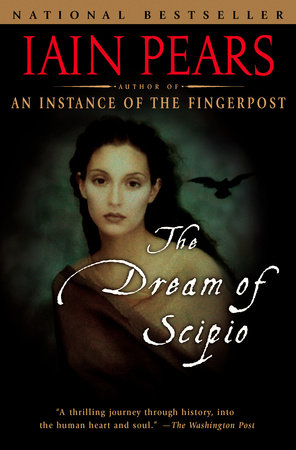READERS GUIDE
Questions and Topics for Discussion
INTRODUCTION
In The Dream of Scipio, “Pears’ finest book yet” (Boston Globe), the acclaimed author of An Instance of the Fingerpostintertwines three intellectual mysteries, three love stories—and three of the darkest moments in human history. United by a classical text called “The Dream of Scipio,” three men struggle to find refuge from the madness that surrounds them…in the final days of the Roman Empire, in the grim years of the Black Death, and in the direst hours of World War II.
ABOUT IAIN PEARSIain Pears was born in 1955. Educated at Wadham College, Oxford, he has worked as a journalist, an art historian, and a television consultant in England, France, Italy, and the United States. He is the author of seven highly praised detective novels, a book of art history, and countless articles on artistic, financial, and historical subjects, as well as the international bestseller An Instance of the Fingerpost. He lives in Oxford, England.
Praise
“Pears builds a multilayered tale of moral choice, love, danger and loss. Like an archaeologist, he uncovers worlds in a few square miles of Provençal earth.”—New York Times Book Review
“An entirely satisfying symphony of story and substance…ingeniously imagined.”—Washington Post
“Braiding together parallel plots of romance and political intrigue set in Provence during three dark eras, The Dream of Scipiois a murder mystery on the grandest scale…[Pears] invests his complex story with piquancy, irony, and humor. There is much to ponder here, from Neoplatonic philosophy to anti-Semitism to public duty….Eye-opening.”—People
“Pears leaves us with a dream, not only of destruction, but of immense and unexpected heroism.”—Boston Globe
DISCUSSION QUESTIONSIn The Dream of Scipio, the stories of Manilus Hippomanes, Olivier de Noyen, and Julien Barneuve are linked through time by a philosophical text which suggests that “man is responsible for his own salvation, but through knowledge, not through deeds or faith.” (p. 154). In other words, “that action is virtuous only if it reflects pure comprehension, and that virtue comes from the comprehension, not the action.” (p. 381). In what ways is this tenet illustrated by the lives of the three main characters? In what ways is it challenged?
“Power without wisdom is tyranny; wisdom without power is pointless.” Discuss the trajectories of Manilus, Olivier and Julien in the context of this phrase. To what degree does each character possess each quality at the beginning of their stories? What about at the end?
The historical events depicted in the novel include the fall of Roman civilization in Gaul; the coming of the plague to Europe; and the fall of France to the Nazis. Do you think that Manilus, Olivier, and Julien are motivated by identical forces at different periods in history? Or are they fundamentally different characters? Discuss.
Sophia advises Manilus to pretend to worship the Christian gods in order to attain power; Olivier reads a letter meant for Ceccani, his employer and protector; Julian betrays Bernard to save Julia without a second thought. Can you think of other morally ambiguous moments in this novel? How do these examples relate to the larger theme of individual responsibility in society? Discuss.
Compare the father-son relationships of Manilus, Julian and Olivier. How is each man shaped by his family history? In what ways does each transcend and fulfill the expectations of his father?
“Do you think that the peace of a thousand cancels out the unjust death of a single person?” Sophia challenges Manilus (p. 389). Why does she see his actions as a corruption of her teachings? What would Sophia say about Olivier’s betrayal of Ceccani? What about Julian’s participation in the Vichy government?
Compare Sophia, Rebecca, and Julia. In what ways do the women act as counterpoints to the male characters in the novel? To what conventions are they bound? To what extent do they fall prey to the norms and restrictions of the times in which they lived? In what ways do they circumvent these proscribed roles?
In all three time periods depicted in the novel, the fate of the Jews of Provence played a central role in the outcome of events. Why do you think the Jews of Manilus’ Vaison, Gersonides and Rebecca, and Julia and Claude Bronsen take on such magnitude in this story? Why are the fates of the different characters so different? What, if anything, can you infer from the final assessment of Gersonides to the contents of the manuscript Olivier brought him? (p.381-382).
Discuss the ways in which the concept of faith relates to the overall themes of the novel. For instance, Gersonides poses the question to Olivier: “…What sort of man can persecute others in the name of a faith he clearly does not profess?” (p.210). How would you answer this question? Is the idea of faith equally relevant to all three storylines? Why or why not? Is Manilus justified in his use of faith to consolidate his power?
Julien Barneuve thinks of himself as “a crusader for the true values of civilization, burning with the love of life and learning in an age that valued neither.” (p. 24). Manilus Hippomanes felt a similar fire, as did Olivier de Noyen, who “had as his private goal the purification of letters, the casting out of the corruption of his times.” (p. 17). Based on the outcome of their three stories, what would you conclude about the aforementioned “true values of civilization”? Are there such things? Who is the arbiter of these values? By what means are they to be preserved? Discuss.

